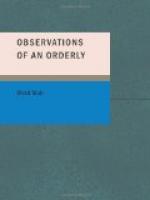Scores of concerts of an excellence which would have been noteworthy anywhere have been presented to our assemblages of wounded in the Old Rec. Singers, musicians, actors and actresses have come and given of their best. Miss Hullah’s Music in War Time Committee (that delightful body), and Mr. Howard Williams’s parties, are perhaps our greatest regular standbys. Certain sections of the public know Mr. Howard Williams’s name as a famous one in other fields of activity: to thousands of soldiers it is honoured as that of the man who tirelessly organised scrumptious tea-parties, pierrot shows, exhibition boxing contests, nigger troupe entertainments—a list of jollifications, indoors in winter and in the open air in summer, infinite in variety and guaranteed never once to fall flat. A curious Empire reputation, this of Mr. Williams!
Yesterday, for instance, a nigger troupe visited the hospital. To be exact, they were the Metropolitan Police Minstrels ("By Permission of Sir E.R. Henry, G.C.V.O., K.C.B., C.S.I., Commissioner"); but no member of the audience, I imagine, could picture those jocose blackamoors, with their tambourines and bones, as really being anything so serious as traffic-controlling constables. That their comic songs were accompanied by a faultless orchestra was understandable enough. One can believe in a police band. One is not surprised that the police band is a good band. To believe that the ebony-visaged person with the huge red indiarubber-flexible mouth who sings “Under the archway, Archibald,” and follows this amorous ditty with a clog dance is—in his washed moments—the terror of burglars, requires unthinkable flights of imagination. As I gazed at this singular resurrection of Moore and Burgess and breathless childhood’s afternoons at the St. James’s Hall—the half circle of inanely alert faces the colour of fresh polished boots—the preposterous uniforms and expansive shirt-fronts—the “nigger” dialect which this strange convention demands but which cannot be said to resemble the speech of any African tribe yet discovered—I found that by no effort of faith or credulity could I pierce the disguise and perceive policemen.
It is at least twenty years since I met a nigger minstrel in the flesh. Vague ghosts of bygone persons and of piquant anachronisms seemed to float approvingly in the air: the Prince Consort, bustles, the high bicycle, sherry, Moody and Sankey, the Crystal Palace, Labouchere, “Pigs in Clover,” Lottie Collins, Evolution, Bimetallism: hosts of forgotten images, names and shibboleths came popping out from the brain’s dusty pigeon-holes, magically released by the spectacle of the nigger troupe.




